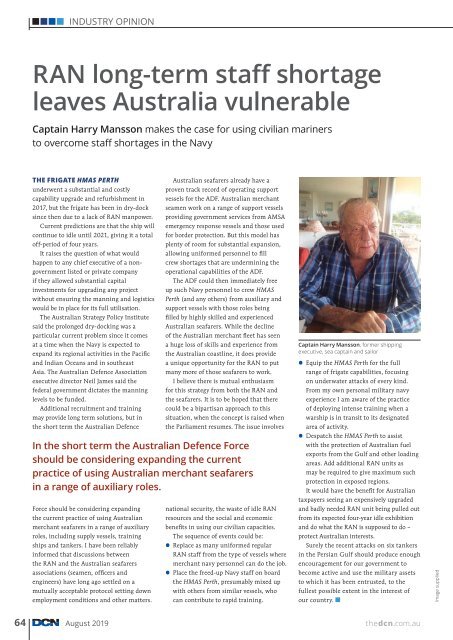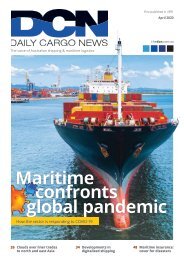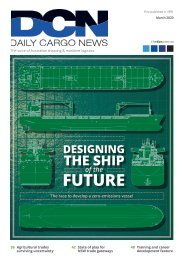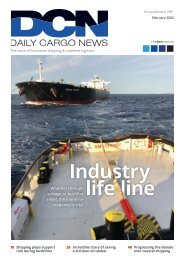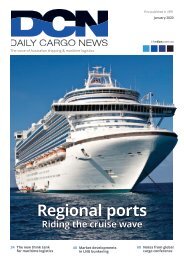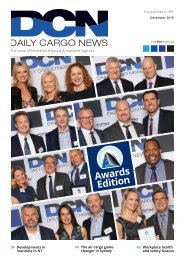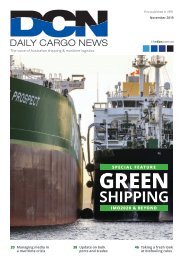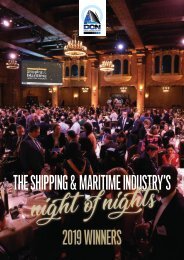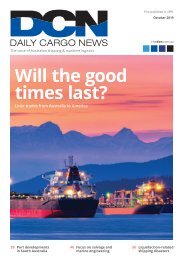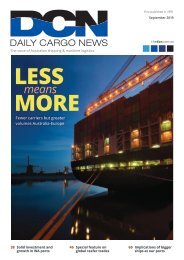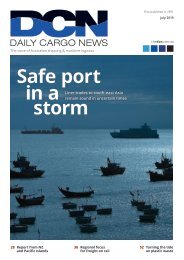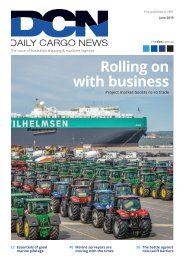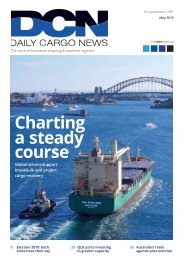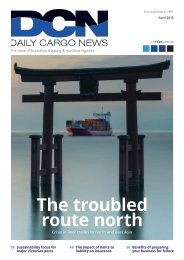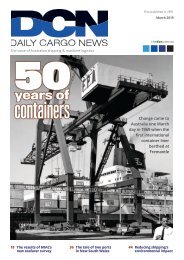DCN AUGUST Edition 2019
Create successful ePaper yourself
Turn your PDF publications into a flip-book with our unique Google optimized e-Paper software.
INDUSTRY OPINION<br />
RAN long-term staff shortage<br />
leaves Australia vulnerable<br />
Captain Harry Mansson makes the case for using civilian mariners<br />
to overcome staff shortages in the Navy<br />
THE FRIGATE HMAS PERTH<br />
underwent a substantial and costly<br />
capability upgrade and refurbishment in<br />
2017, but the frigate has been in dry-dock<br />
since then due to a lack of RAN manpower.<br />
Current predictions are that the ship will<br />
continue to idle until 2021, giving it a total<br />
off-period of four years.<br />
It raises the question of what would<br />
happen to any chief executive of a nongovernment<br />
listed or private company<br />
if they allowed substantial capital<br />
investments for upgrading any project<br />
without ensuring the manning and logistics<br />
would be in place for its full utilisation.<br />
The Australian Strategy Policy Institute<br />
said the prolonged dry-docking was a<br />
particular current problem since it comes<br />
at a time when the Navy is expected to<br />
expand its regional activities in the Pacific<br />
and Indian Oceans and in southeast<br />
Asia. The Australian Defence Association<br />
executive director Neil James said the<br />
federal government dictates the manning<br />
levels to be funded.<br />
Additional recruitment and training<br />
may provide long term solutions, but in<br />
the short term the Australian Defence<br />
Force should be considering expanding<br />
the current practice of using Australian<br />
merchant seafarers in a range of auxiliary<br />
roles, including supply vessels, training<br />
ships and tankers. I have been reliably<br />
informed that discussions between<br />
the RAN and the Australian seafarers<br />
associations (seamen, officers and<br />
engineers) have long ago settled on a<br />
mutually acceptable protocol setting down<br />
employment conditions and other matters.<br />
Australian seafarers already have a<br />
proven track record of operating support<br />
vessels for the ADF. Australian merchant<br />
seamen work on a range of support vessels<br />
providing government services from AMSA<br />
emergency response vessels and those used<br />
for border protection. But this model has<br />
plenty of room for substantial expansion,<br />
allowing uniformed personnel to fill<br />
crew shortages that are undermining the<br />
operational capabilities of the ADF.<br />
The ADF could then immediately free<br />
up such Navy personnel to crew HMAS<br />
Perth (and any others) from auxiliary and<br />
support vessels with those roles being<br />
filled by highly skilled and experienced<br />
Australian seafarers. While the decline<br />
of the Australian merchant fleet has seen<br />
a huge loss of skills and experience from<br />
the Australian coastline, it does provide<br />
a unique opportunity for the RAN to put<br />
many more of those seafarers to work.<br />
I believe there is mutual enthusiasm<br />
for this strategy from both the RAN and<br />
the seafarers. It is to be hoped that there<br />
could be a bipartisan approach to this<br />
situation, when the concept is raised when<br />
the Parliament resumes. The issue involves<br />
In the short term the Australian Defence Force<br />
should be considering expanding the current<br />
practice of using Australian merchant seafarers<br />
in a range of auxiliary roles.<br />
national security, the waste of idle RAN<br />
resources and the social and economic<br />
benefits in using our civilian capacities.<br />
The sequence of events could be:<br />
• Replace as many uniformed regular<br />
RAN staff from the type of vessels where<br />
merchant navy personnel can do the job.<br />
• Place the freed-up Navy staff on board<br />
the HMAS Perth, presumably mixed up<br />
with others from similar vessels, who<br />
can contribute to rapid training.<br />
Captain Harry Mansson, former shipping<br />
executive, sea captain and sailor<br />
• Equip the HMAS Perth for the full<br />
range of frigate capabilities, focusing<br />
on underwater attacks of every kind.<br />
From my own personal military navy<br />
experience I am aware of the practice<br />
of deploying intense training when a<br />
warship is in transit to its designated<br />
area of activity.<br />
• Despatch the HMAS Perth to assist<br />
with the protection of Australian fuel<br />
exports from the Gulf and other loading<br />
areas. Add additional RAN units as<br />
may be required to give maximum such<br />
protection in exposed regions.<br />
It would have the benefit for Australian<br />
taxpayers seeing an expensively upgraded<br />
and badly needed RAN unit being pulled out<br />
from its expected four-year idle exhibition<br />
and do what the RAN is supposed to do –<br />
protect Australian interests.<br />
Surely the recent attacks on six tankers<br />
in the Persian Gulf should produce enough<br />
encouragement for our government to<br />
become active and use the military assets<br />
to which it has been entrusted, to the<br />
fullest possible extent in the interest of<br />
our country.<br />
Image supplied<br />
64 August <strong>2019</strong><br />
thedcn.com.au


